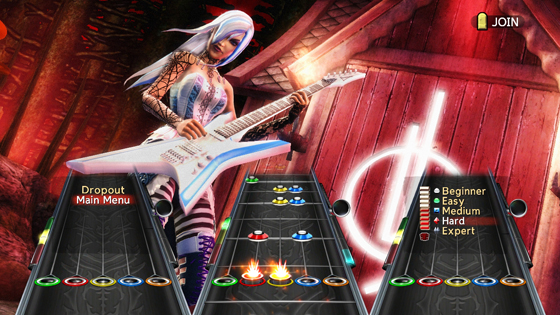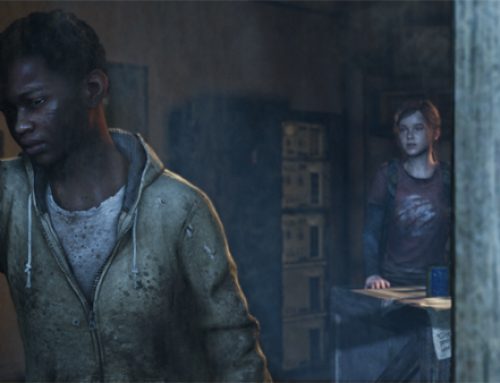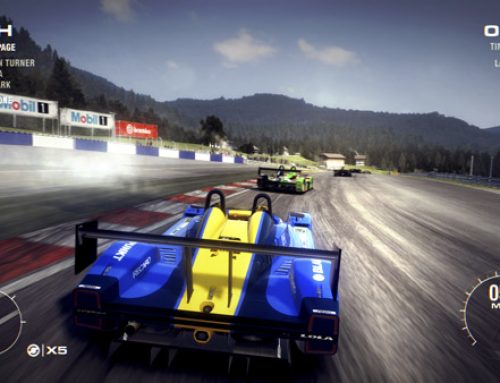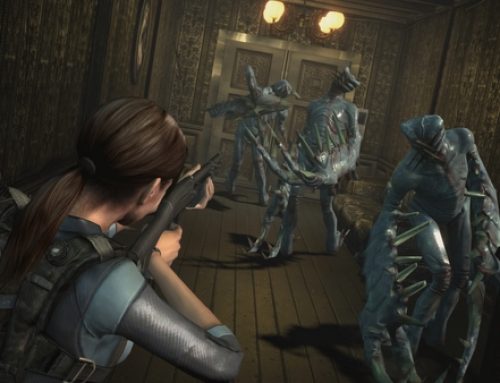
A new, story-driven approach for "Guitar Hero: Warriors of Rock" wasn't enough to turn the franchise back into a moneymaker for Activision.
Activision, the world’s largest video game publisher, dropped a few bombshells in its quarterly earnings call Wednesday, none bigger than the announcement that it would cease making “Guitar Hero” games.
To people who only sort of follow the video game industry, this probably seemed like a huge shock. Everyone’s heard of “Guitar Hero,” and since the series made its debut in 2005 on the PlayStation 2, its plastic guitars have inspired an episode of “South Park,” been blamed for the injury of a Major League Baseball player and incurred the wrath of nongaming oldsters demanding kids pick up “real instruments.”
In fact, “Guitar Hero” became such a phenomenon, a lot of people probably use it as a catch-all term to describe both Activision’s games and Harmonix Music Systems’ “Rock Band” titles, as well as lesser lights like Konami’s “Rock Revolution” and those standalone plug-and-play things you can buy at Walgreens.
Fans of the music game genre, though, have seen this day of reckoning coming. The “Guitar Hero” franchise, whose games were once made by Harmonix and published by RedOctane, have struggled to find their creative footing since Activision bought only RedOctane while leaving Harmonix, the software guys, to be snapped up by Viacom-owned MTV.
The first “Guitar Hero” game made without Harmonix, 2007’s “Guitar Hero III: Legends of Rock” alienated some fans with its emphasis on “battles” between the player and computer-controlled celebrities such as Slash and Tom Morello. A month after “GHIII’s” release, Harmonix and MTV put out “Rock Band,” an expensive competitor that featured support for up to four players and became an instant hit at parties and bars looking for weeknight special events. The fusion of karaoke and drum-playing with the “Guitar Hero” formula kicked the craze into overdrive, or star power if you prefer.
Even though the “Guitar Hero” games had the name recognition and better sales, it felt like Activision was constantly playing catch-up. Eventually, we got “Guitar Hero: World Tour” (sometimes called “Guitar Hero IV”) and “Guitar Hero V,” two competently executed full-band games that didn’t bring much new to the table beyond a create-your-own song mode and a bizarre emphasis on creating likenesses of famous rockers, dead or alive, with sometimes hilariously awkward results.
When I previewed “Guitar Hero: Warriors of Rock” (aka “Guitar Hero 6”) at last year’s E3, the writing was on the wall: Activision had stopped trying to compete directly with Harmonix, and it was going to retrench and go after the hardcore metal and hard-rock fan, the folks who’d helped make “Guitar Hero” such a huge hit in the first place. In the end, though, it was too little, too late. And now the series is on hiatus.
“Rock Band” is in a bit of a limbo, too. MTV Games, who spent big to acquire Harmonix, recently sold the studio to a private equity firm that agreed to assume massive “Rock Band”-related debts. For its part, Harmonix has a bona fide hit on its hands with “Dance Central” for Kinect, and maybe profits from the latest gaming craze will help erase the debts from the last one.
We music game fans will have to learn to make due with what we have already, and snap up downloadable content as we debate where it all went wrong.
In this blogger’s humble opinion, the music game business took its first wrong turn when RedOctane and Harmonix were split up. It was always obvious that Harmonix made better rock ‘n’ roll software than Activision’s studios, but RedOctane made better guitars. (My “Rock Band” guitar had a busted strum bar right of the box, and it took several tries before I could get a working one.) Even though the guitars bundled with the “Rock Band” games eventually improved, MTV always cited their manufacturing costs as a key reason the franchise could never turn a profit.
The other wrong turn happened when Activision and MTV decided to start signing exclusive deals with artists such as Metallica, AC/DC and Aerosmith, ensuring that each artist would work with only one company. This wasn’t the worst idea in and of itself, but in order to secure such deals, the companies committed to release standalone games devoted to particular artists.
Of these standalone releases, only “Guitar Hero: Metallica” and “The Beatles: Rock Band” could objectively be called good games. While “Guitar Hero: Aerosmith” and “Green Day: Rock Band” were decent fan service, they failed to become classics while “Guitar Hero: Van Halen” and “AC/DC Live: Rock Band Track Pack,” initially sold exclusively at Wal-Mart, will be cluttering Goodwill stores for decades.
As all these artist-themed titles hit the market, Activision was still cranking out a numbered “Guitar Hero” a year, as well as spinning off new franchises “Band Hero” (aimed at kids) and the underrated “DJ Hero.” Harmonix and MTV, for their part, took things slightly slower, focusing on selling songs and albums as downloadable add-ons that could be used in the core “Rock Band” titles.
To the music game fan, it seemed as if Activision was strip-mining the franchise, trying to wring as much profit out of the genre as possible while the getting was good. In 2008 and 2009, Activision released “Guitar Hero: World Tour” and “Guitar Hero 5,” plus Aerosmith, Van Halen and Metallica titles, the spinoffs “Band Hero” and “DJ Hero,” and a shameful cash-in title, “Guitar Hero: Smash Hits,” which simply updated tracks from the first two PlayStation 2 games for play on the current generation of consoles. In the same window, Harmonix released “Rock Band 2,” “The Beatles: Rock Band” and “Lego Rock Band.” Oh, and let’s not forget the portable “Rock Band: Unplugged.”
That’s a lot of strumming, and the fact that some players eventually grew tired of it wasn’t a huge surprise.
From a quality standpoint, “Rock Band 3” is, along with Activision’s “DJ Hero 2,” the most polished, feature-packed game the genre has to offer. I’d eagerly recommend both games to anyone. But whether “Rock Band 3” will sell well enough to justify another sequel, or if Harmonix will sustain its franchise with downloadable content alone, will likely remain a mystery until at least this summer.
For its part, Activision’s studios said they would release downloadable content for the “DJ Hero” and “Guitar Hero” games through the end of the month. After that, it’s kaput.



